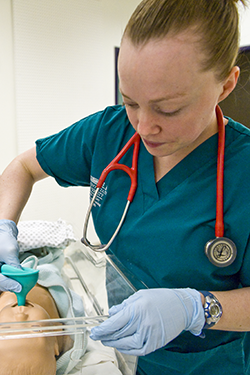On this page:
- Why Choose the Neonatal Nurse Practitioner Concentration?
- Academics and Curriculum
- Admission
- Program Outcomes
- Contact Information
Why Choose the Neonatal Nurse Practitioner Concentration?
The Neonatal Nurse Practitioner concentration is designed to prepare you with the knowledge and skills necessary to provide a high level of comprehensive care to ill newborns and their families, patients residing in the neonatal intensive care unit, and high-risk infants and children through the age of 2.
The course of study consists of 55 credit hours to complete the Neonatal Nurse Practitioner concentration.
Upon completion of the concentration, you will be eligible to take the Neonatal Nurse Practitioner certification exam offered by the National Certification Corporation. National certification is necessary to obtain advanced practice licensure in most states. The master's degree program in nursing at Wright State University is accredited by the Commission on Collegiate Nursing Education http://www.ccneaccreditation.org.
Post-Master’s Training
We’re pleased to offer educational opportunities to post-master’s applicants. To determine the number of clinical hours and didactic courses, a gap analysis will be conducted. Depending upon this analysis, students can complete the program in one to two years. Please email Tonya Schmitt at tonya.schmitt@wright.edu to discuss the post-master’s program.
Academics and Curriculum

View the Master of Science program information and degree requirements in the Academic Catalog.
For purposes of student eligibility for certification, all Neonatal Nurse Practitioner required courses must be taken as part of the program of study while in the NNP program or challenged either by examination or demonstration of similar course content in another masters nursing program. Efforts will be made to meet students' individual goals and to provide experiences in their geographical area. Clinical courses are supervised by the NNP faculty. Clinical rotations will take place at Dayton Children’s Hospital, Miami Valley Hospital, Kettering Hospital, selected follow-up clinics, and some laboratory experiences on-site at the University of Cincinnati.
Students can begin classes summer, fall, or spring. Individualized plans, including part-time, will be developed on admission.
Please see list of required courses (DOCX).
Admission
Due Dates/Program Start
- December 1 for Spring Semester start
- April 1 for Summer Semester start
- July 31 for Fall Semester start
Application to Wright State University’s School of Nursing is a two-step process.
-
Apply to Wright State Graduate School
Required Documents
The documents listed below should be uploaded directly to your School of Graduate Studies online application. Please do not send these materials to the School of Nursing.
- Graduate School application (online)
- Transcripts from all colleges/universities attended
- Resume/curriculum vitae
- Meaningful Clinical Experience Essay (2 pages maximum)
- Statement of Professional Goals (250 words maximum)
- Provide name and email address of two references for letters of recommendation
- Current or most recent supervisor
- Faculty member from your nursing program, or previous employer
When the Graduate School application is complete, notification will automatically be sent to the School of Nursing, and we will communicate our application requirements.
-
Apply to the School of Nursing
Required Documents
The school will provide instructions on how to complete the above steps once we receive notification of the completed School of Graduate Studies application. All School of Nursing-required documents should be sent directly to the School of Nursing.
Admission Requirements
- Be a bachelor’s prepared nurse, having earned a B.S.N. in nursing from an accredited institution.
- Have a cumulative grade point average of 3.0 or higher on a 4.0 scale from your baccalaureate degree and any subsequent graduate work.
- Hold an unencumbered nursing license.
- Have a minimum of two years of full-time nursing experience in a Level III neonatal intensive care unit prior to the start of clinical courses.
- Provide evidence of no criminal record on file through a clear BCII/FBI background screen.
- International Students
- Must provide proof of English proficiency by achieving at least the minimum score in one of the following:
- TOEFL IBT: 79
- IELTS: 6.0
- Pearson PTE: 57
- Students who show proof of successful completion of an Intensive English Program from an accredited Institution or program accepted by international admissions are exempt from the requirement to take an approved English Proficiency exam.
- Must have an unencumbered United States nursing license.
- Must provide proof of English proficiency by achieving at least the minimum score in one of the following:
Program Outcomes
The M.S. graduate will:
- Examine scientific findings from nursing, biopsychosocial fields, genetics, public health, quality improvement, and organizational sciences for the continual improvement of nursing care across diverse settings
- Demonstrate leadership skills necessary for ethical and critical decision-making, effective working relationships, and a systems-perspective to promote high quality and safe patient care
- Apply quality principles within an organization and articulate the methods, tools, performance measures, and standards related to quality
- Apply evidence-based outcomes within the practice setting, resolving practice problems, working as a change agent, and disseminating results
- Use communication strategies and patient-care technologies to integrate, coordinate, deliver, and enhance care
- Examine the policy development process and advocacy strategies necessary to intervene at the system level to influence health and health care
- Use communication strategies necessary for interprofessional collaboration and consultation to manage and coordinate care
- Integrate broad, organizational, client-centered, and culturally appropriate concepts in the planning, delivery, management, and evaluation of evidence-based clinical prevention and population care and services to individuals, families, and aggregates/identified populations
- Demonstrate advanced level of understanding of nursing and relevant sciences as well as the ability to integrate this knowledge into practice including both direct and indirect care components that influence health care outcomes for individuals, populations, or systems
Contact Information
Concentration Contact:
Tonya Schmitt, DNP, CPNP-PC, APRN
Assistant Professor
Program Director
tonya.schmitt@wright.edu
Nursing Graduate Advisor:
Crystal R. Hammond, MSN, APRN, CNM, FNP-C
Clinical Assistant Professor
937-775-3778
crystal.hammond@wright.edu
